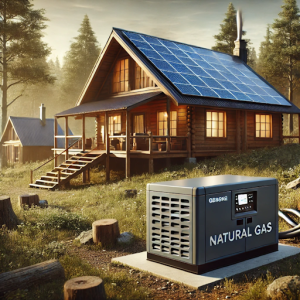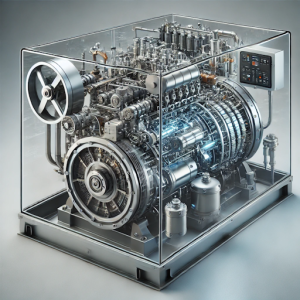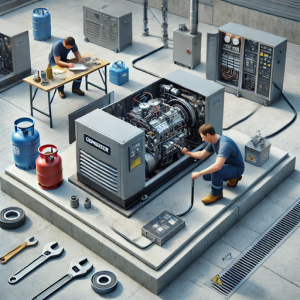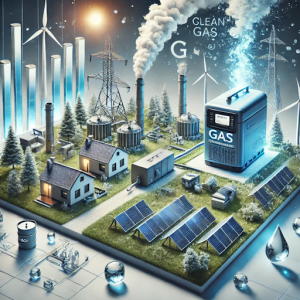Unlock Sustainable Off-Grid Living with Reliable Natural Gas Generators
Natural gas generators stand out as a prime choice for individuals seeking a consistent and trustworthy power source for homes or cabins located in remote areas. As you embark on your off-grid journey, acquiring a thorough understanding of various power generation methods is vital. The distinct advantages of natural gas generators—including their exceptional reliability, cost-effectiveness, and eco-friendly attributes—make them an attractive option for off-grid living enthusiasts who prioritize sustainability and operational efficiency in their energy solutions.
In today’s technology-driven world, the concept of off-grid living has captivated many. Whether motivated by a commitment to sustainability, a quest for autonomy, or the desire for a self-sufficient lifestyle, disconnecting from conventional power grids can be incredibly rewarding. Off-grid energy solutions allow you to tap into renewable resources or alternative fuels, resulting in a comfortable living experience free from reliance on traditional electricity sources.
Equipping yourself with the appropriate knowledge and preparation enables you to seamlessly incorporate a natural gas generator into your off-grid lifestyle, ensuring that your fundamental needs are consistently met with a reliable power supply. This article delves into the numerous benefits of natural gas generators, elucidates their operational mechanisms, and outlines crucial considerations for selecting and installing them in your off-grid configuration.
 Enhance Your Off-Grid Power Solutions with Key Insights
Enhance Your Off-Grid Power Solutions with Key Insights
- Off-grid power solutions empower you to break free from traditional energy sources, making them essential for remote living or during unforeseen power outages.
- Natural gas generators provide dependable and efficient energy production, with significantly lower emissions compared to diesel or gasoline alternatives.
- These generators operate by combusting natural gas to create mechanical energy, which is then converted into electrical energy through a generator system.
- When choosing a natural gas generator, it’s crucial to evaluate aspects such as power output, fuel efficiency, and maintenance needs to ensure optimal performance.
- Proper installation and routine maintenance are essential for the safe and effective operation of your natural gas generator.
Explore the Exceptional Advantages of Natural Gas Generators for Energy Needs
A key attribute of natural gas generators is their outstanding reliability. By selecting a natural gas generator to fulfill your off-grid energy requirements, you can depend on a steady power supply customized to your specific needs. Unlike solar panels or wind turbines, which can be negatively affected by changing weather conditions, natural gas generators deliver stable energy outputs, impervious to external factors.
This reliability is particularly vital for individuals who depend on electricity for critical functions such as heating, refrigeration, or operating medical devices. The peace of mind that comes from knowing your generator will provide power precisely when needed is invaluable. Additionally, natural gas generators offer significant cost savings.
While the initial investment may surpass that of some alternative off-grid solutions, the long-term savings can be substantial. Natural gas typically costs less than gasoline or diesel, leading to reduced operating expenses over time. Moreover, the maintenance requirements for natural gas generators are generally less demanding than those for other types, allowing you to conserve both time and resources while enjoying a steadfast and reliable energy source.
 Gain Insight into the Operational Mechanics of Natural Gas Generators
Gain Insight into the Operational Mechanics of Natural Gas Generators
Natural gas generators operate by converting the chemical energy found in natural gas into electrical energy through a combustion process. When the generator is activated, natural gas mixes with air and ignites within the engine’s combustion chamber. This ignition produces high-pressure gases that drive the engine’s pistons, ultimately rotating the generator’s rotor and generating electricity.
This operational method is especially commendable for its efficiency, as it is cleaner than other fossil fuel options on the market. A critical component of a natural gas generator is its fuel system, which generally includes a regulator to control gas flow and ensure peak performance. Modern natural gas generators are equipped with advanced features like automatic start/stop capabilities and remote monitoring systems.
These technological innovations greatly enhance user convenience, allowing for more effective power supply management and simplifying your off-grid lifestyle.
Essential Considerations When Choosing a Natural Gas Generator
| Consideration | Description |
|---|---|
| Power Output | Determine the generator’s required power output based on the specific appliances and equipment you intend to operate. |
| Fuel Type | Consider natural gas as your fuel choice for its clean-burning and cost-effective characteristics. |
| Size and Portability | Choose a generator size and portability that align with your available space and mobility requirements. |
| Noise Level | Evaluate the generator’s noise output to ensure compliance with acceptable standards for your living environment. |
| Start-up Mechanism | Decide between manual or automatic start-up options based on your convenience and usage frequency. |
When selecting a natural gas generator for your off-grid setup, several critical factors must be meticulously assessed. First and foremost, evaluate your power needs. Calculate the total wattage needed to support your essential appliances and devices, ensuring that the generator you choose can effectively handle the load.
It is advisable to opt for a generator with slightly higher capacity than your calculated requirements to accommodate potential spikes in power demand. Another significant consideration is the generator’s portability and installation prerequisites. If you intend to relocate your generator frequently or utilize it in various locations, prioritize a lightweight and easily transportable model.
Additionally, deliberate whether you prefer a fixed installation or a portable unit that can be easily set up as necessary. Lastly, pay attention to the generator’s noise level; quieter models can greatly enhance your off-grid experience by minimizing disturbances and preserving the serenity of your natural surroundings.
 Implement Effective Installation and Maintenance Practices for Natural Gas Generators
Implement Effective Installation and Maintenance Practices for Natural Gas Generators
The successful installation of a natural gas generator hinges on meticulous planning and execution to ensure both safety and efficiency. Begin by selecting a suitable location for your generator, ensuring compliance with local regulations and safety standards. This location should ideally be well-ventilated and adequately distanced from flammable materials.
Consider establishing a concrete pad or platform to stabilize and protect the generator from moisture-related damage. Once the optimal location is identified, connect the generator to your natural gas supply line. If you lack experience in gas line installations, it’s wise to seek professional assistance to guarantee adherence to all safety protocols.
After the fuel connection is established, set up the necessary electrical connections to integrate the generator with your home’s electrical system. Regular maintenance is essential for keeping your generator operating efficiently. This involves routine checks on oil levels, replacing air filters, and inspecting spark plugs to sustain optimal performance.
Cost Comparison: Evaluating Natural Gas Generators Against Other Off-Grid Power Solutions
When analyzing the costs associated with off-grid energy options, it is crucial to conduct a comprehensive comparison between natural gas generators and alternative solutions, such as solar panels and diesel generators. While solar energy systems have gained popularity for their renewable attributes, they often require a substantial upfront investment in panels, batteries, and inverters. Furthermore, solar systems may struggle to provide sufficient power during overcast days or at night without adequate battery storage.
Conversely, diesel generators are recognized for their dependability; however, they entail higher fuel expenses and more frequent maintenance compared to natural gas generators. Given that diesel fuel prices can vary significantly, natural gas often presents a more stable and frequently lower-cost option in many areas. A long-term expense analysis reveals that natural gas generators typically offer a more economical solution for those pursuing off-grid living.
 Evaluate the Environmental Impact of Natural Gas Generators for Off-Grid Living
Evaluate the Environmental Impact of Natural Gas Generators for Off-Grid Living
As you explore your off-grid energy options, it is essential to assess their environmental impact. Natural gas is frequently regarded as a cleaner alternative to other fossil fuels, including coal and oil, due to its lower carbon emissions during combustion. By opting for a natural gas generator, you can notably reduce your carbon footprint while enjoying reliable power for your off-grid lifestyle.
However, it is important to acknowledge that natural gas remains a fossil fuel, and its extraction can lead to environmental repercussions. Methane leaks during the extraction and transportation processes pose significant challenges regarding greenhouse gas emissions. To mitigate these effects, prioritize sourcing natural gas from reputable suppliers who are committed to sustainable practices.
Moreover, integrating renewable energy sources alongside your natural gas generator can further demonstrate your commitment to environmental sustainability and responsible energy consumption.
Real-Life Success Stories Highlighting Effective Off-Grid Living with Natural Gas Generators
Investigating real-world examples can provide invaluable insights into how natural gas generators have been effectively utilized in off-grid living scenarios. For instance, numerous rural homeowners have successfully transitioned to natural gas generators as their primary energy source after experiencing frequent outages from traditional utility services. The implementation of these generators has empowered them to achieve energy independence while ensuring a continuous electricity supply for heating, cooling, and essential appliances.
Another compelling case study involves remote cabins that depend on natural gas generators for seasonal use. Due to their isolated locations, these cabins often lack access to conventional power sources. Natural gas generators allow cabin owners to enjoy modern conveniences such as refrigeration and lighting without sacrificing their connection to the natural environment.
These success stories illustrate how natural gas generators can effectively support off-grid living, providing both comfort and reliability. As you embark on your journey toward off-grid living, consider the extensive benefits that natural gas generators offer. From their reliability and cost-effectiveness to their relatively low environmental impact, these generators can play a crucial role in achieving energy independence.
By carefully selecting the right model for your needs and adhering to proper installation and maintenance practices, you can smoothly transition into an off-grid lifestyle powered by natural gas.
Comprehensive Answers to Common Questions About Natural Gas Generators
What features define a natural gas generator suitable for off-grid applications?
A natural gas generator designed for off-grid living is a power generation system that utilizes natural gas as a fuel source to produce electricity in remote areas where access to the main power grid is limited or absent.
How does a natural gas generator operate in off-grid settings?
A natural gas generator intended for off-grid applications operates by burning natural gas within an internal combustion engine. This combustion process generates mechanical energy, which is subsequently converted into electrical energy via a generator. The electricity produced can power various appliances, equipment, and lighting in off-grid environments.
What are the main advantages of using a natural gas generator for off-grid living?
Key benefits of utilizing a natural gas generator for off-grid living include:
– Lower fuel costs compared to diesel or gasoline generators
– Cleaner combustion leading to reduced emissions
– Continuous fuel supply sourced from natural gas pipelines
– Lower maintenance requirements relative to other fuel types
What considerations should be taken into account when using a natural gas generator for off-grid living?
Crucial considerations when employing a natural gas generator in off-grid scenarios include:
– Availability of natural gas supply in your area
– Initial installation and equipment costs
– Regular maintenance and servicing needs
– Environmental implications and compliance with emissions regulations
Is the use of a natural gas generator for off-grid applications feasible for both residential and commercial purposes?
Natural gas generators designed for off-grid use are suitable for both residential and commercial applications. They are frequently employed in remote homes, cabins, farms, and small businesses lacking connectivity to the main power grid.
The post Natural Gas Generators for Off-Grid Power Solutions appeared first on Survival Bite.
The Article Natural Gas Generators: Your Off-Grid Power Solution Was Found On https://limitsofstrategy.com
The Article Natural Gas Generators as Your Off-Grid Power Source First Appeared ON
: https://ad4sc.com










Comments are closed